Review by Chris Rennirt
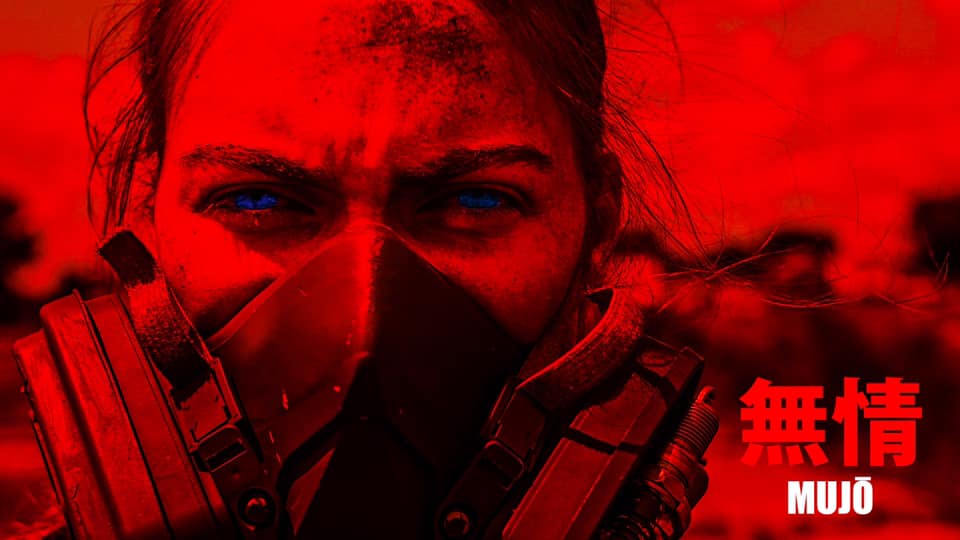
In June of 2019, I wrote about a sci-fi series in the works called MUJŌ (written, directed, and executive-produced by Steve Squall). At that time, with only a short teaser trailer, I knew it was something special, and something I definitely wanted to see. After its premiere, I’m back to say, “MUJŌ ‘Chapter A: Da Introduction’ did not disappoint!” More than not disappointing me, it amazed me. Yes! From filmmakers in my hometown of Louisville, Kentucky, begins a world-class, epic-sized sci-fi series, already launching ten rockets at SJR!
“What is your name, brave traveler?” “META”
Yes! I remember it well. After seeing just the trailer, I wrote “Meta (actress Olivia Duff), with the look of death, breathes heavily in a gas mask, cocking and aiming a gun, unflinching, as a car roars toward her.” As MUJŌ “Chapter A, Da Introduction” begins, reverberating ticks of an analog clock are heard, synced with a visual, digital countdown. In a house neglected and dirty, empty liquor bottles crowd a tabletop, and an ash tray, full of butts, sits next to a gun–all signs of dysfunction, self-abuse, and self-destruction, or perhaps, ingenious (albeit flawed) attempts at coping. Suddenly, on cue, the car/gun showdown from the trailer repeats in a nightmare. The combat-booted, heat-packing, “wasteland warrior,” breathing heavily in a gas mask–staring straight ahead with blue, electrified eyes–is aiming again! But, now, at 95 seconds in, and the car speeding ever closer, there’s over 16 minutes of movie left. At last, the story begins!
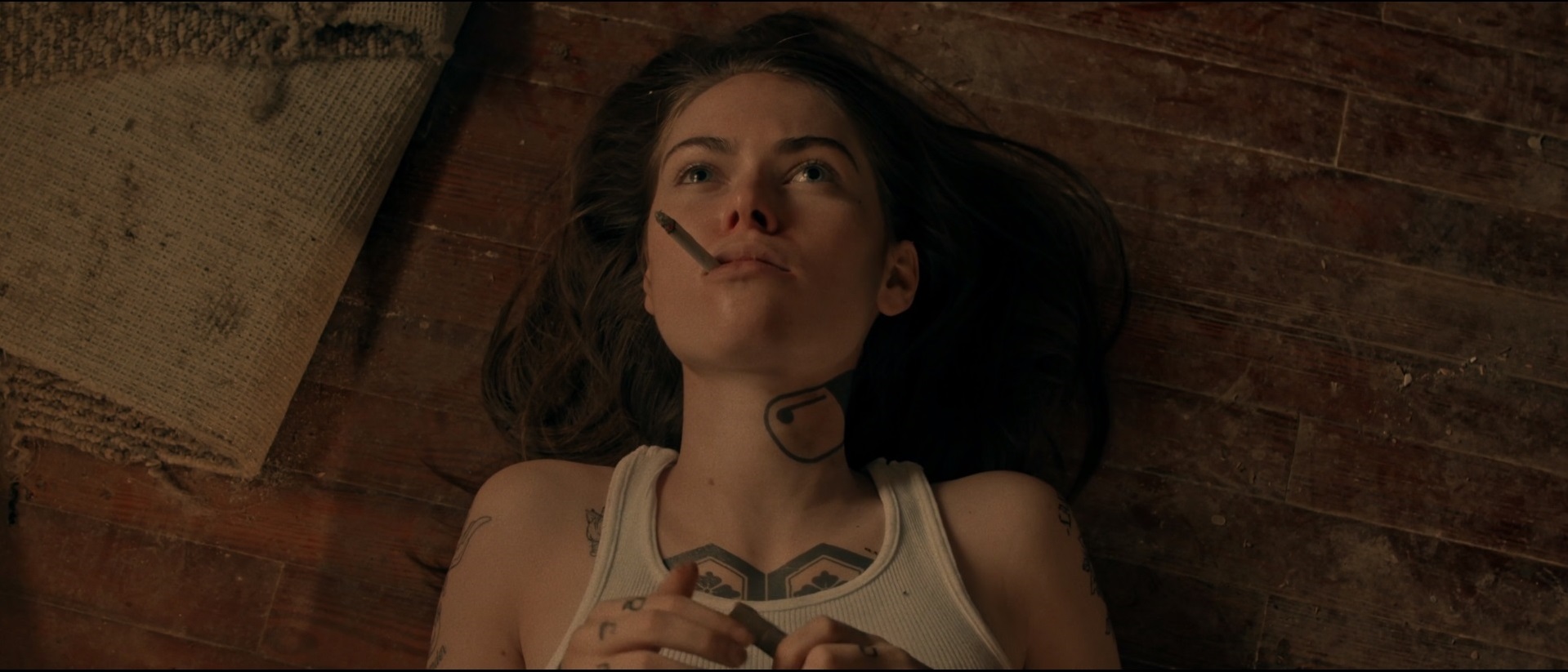
Meta (Olivia Duff)–tattooed, smoking and pensive.
What’s next? First, and most importantly, there’s Olivia Duff as Meta. Duff delivers a standout performance, effortlessly. Perfect for the role, she develops Meta’s character with actions, expressions, and body language alone. And how necessary that is with Meta saying not a word (without a need for words, with no one else around). No! There is nothing expository here to fill us in; there’s no telling us anything in a boring voice-over. Duff, instead, shows us all that’s needed. Before the end of Chapter A, we know Meta, or we think we do; she is, in many ways, much like someone we already know but, possibly, we sense, unlike all we expect. Duff makes the dichotomy of perception possible, with an on-screen presence that speaks to us, silently but profoundly. She exudes Meta’s girl-next-door innocence, naturally, later becoming something totally different, in nightmares. And, although I have never before commented on an actor’s performance of an orgasm, I must do it here. “How much more realistic can one be?” is the question that says it all. But, beyond the magnificence of Meta’s orgasm (and before I digress), there are other questions yet to be answered. What is Meta’s story? How did she end up in such a place? What is her past, her present, and her future? It is this all-important beginning of MUJŌ that–thanks to Duff–makes us care about Meta and want to know more. It is, with Olivia Duff’s sensational ability to show us, that we will certainly know!
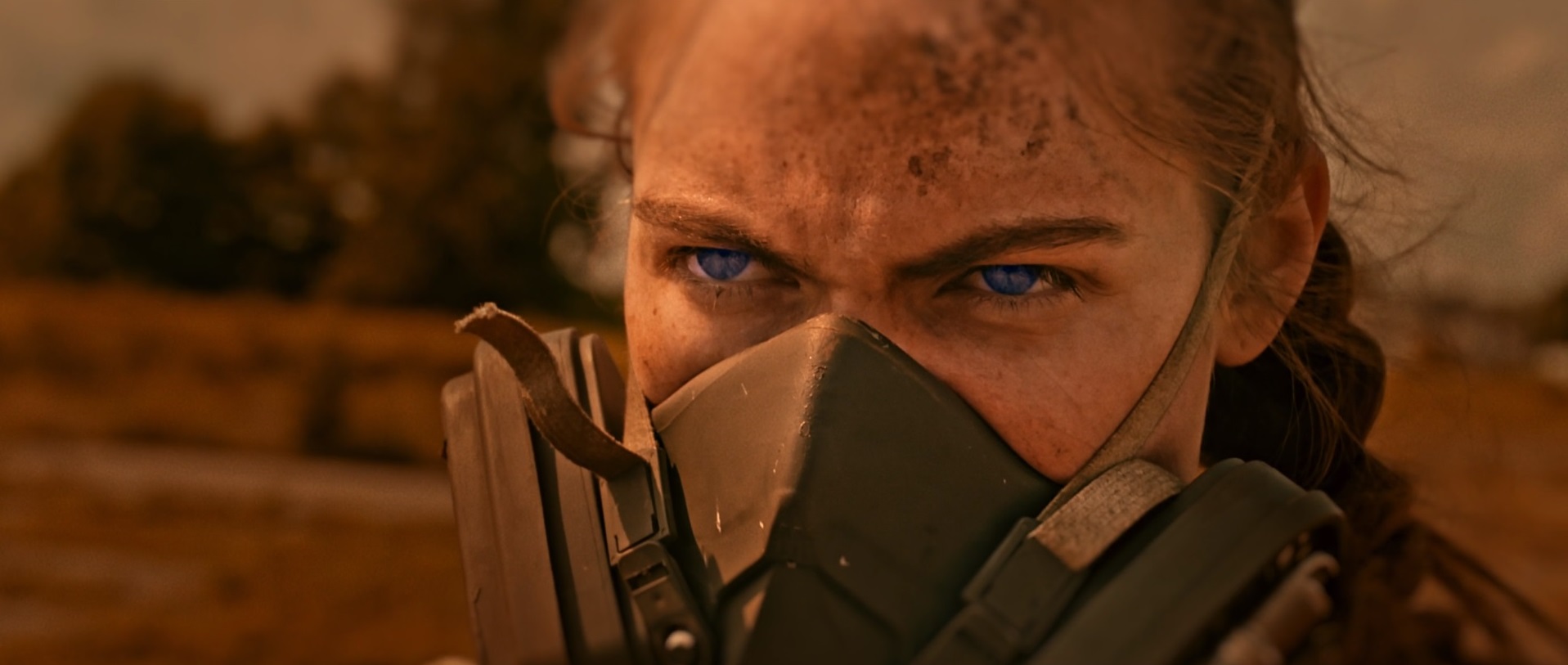
Meta–the combat-booted “wasteland warrior”–is aiming, locked and loaded again!
MUJŌ “Chapter A, Da Introduction” is the beginning of a post-apocalyptic sci-fi story in which the grit, dirt and rawness of nature symbolize and mirror the imperfections of humans (represented by Meta) as they are intrinsically and uncivilized–people trying to survive, coping and adapting in sometimes primal and destructive ways. In the first chapter, we see a hint of Meta’s further transformation, mentally, as she experiences failure making compassionate choices in a video game. This, I believe, is at the core of MUJŌ‘s apocalyptic meaning and significance, related to and paralleling the degeneration of humanness. Meta and the place she calls home are not only connected, but perhaps also, together, a microcosm of the world and people beyond, as a metaphor. Of course, there’s no way I can be sure about all of that yet, after only the first chapter. Perhaps, there’s no way I can ever be sure about it. But, as a full payload of sci-fi mind fuel, MUJŌ makes us think…a lot. This, along with the mystery of Meta, is an important element that Squall adds to his “odyssey” in its all-important beginning. With clues, references, symbols and mysteries, Squall (like Meta) makes us think, deeper, wanting to know more, making us. possibly, reevaluate our thoughts along the way.
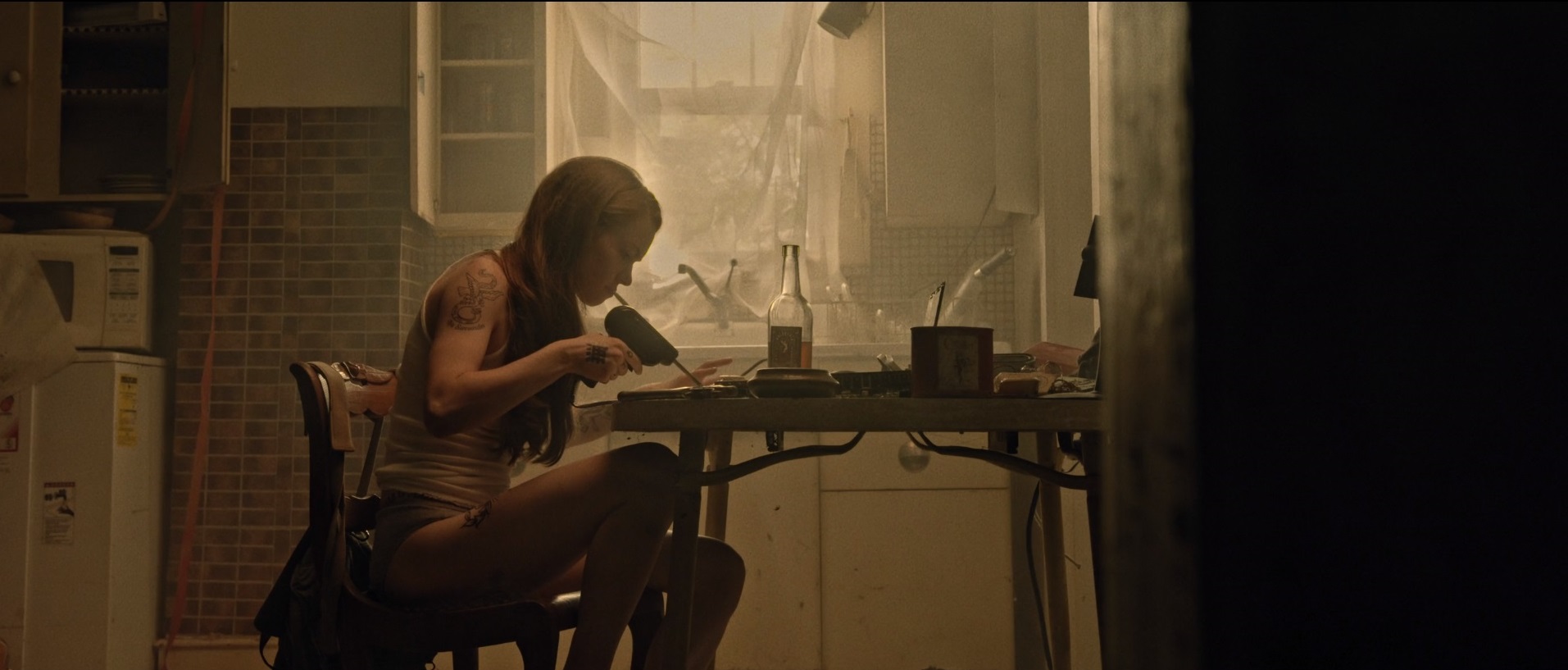
Meta, with a drill in hand, a cigarette in the mouth, and a whiskey bottle half empty.
This first chapter of MUJŌ, as it begins, could be in any time and place. Technologies from the past (an 80s-style video game on a on a retrofuturistic CRT monitor) and those from the present are mixed together. Later references–the numbers of a COVID pandemic, along with holographic cyber visuals (shown with outstanding special effects)–suggest a time certainly in the future. The juxtaposition of anachronistic technology, along with the Meta’s mysteries, make MUJŌ increasingly (and refreshingly) more cerebral than surface level, more mental than melodramatic, light years ahead of the rest.
“Just use that big heart that you tell everyone that you don’t have…and I promise I’ll be ready for you.” ~ Ozzy
Yes! MUJŌ is packed with references to things yet to be revealed, making for endless possibilities in the series. (And I have great expectations that Squall will make good use of them all, adding more along the way.) What is the meaning of the pill/capsule image on Meta’s jacket? Is it something more than the obvious suggestion that she abuses drugs? What do the Chinese characters mean–those above the MUJŌ title? (Since my wife is Chinese, I do know; but, I’m not telling.) Who is Ozzy–the recorded female voice talking to Meta–and is her name another reference? What is the significance of the ticking, digital timer and its countdown, shown repeatedly? What is Meta’s mission, beyond the end of Chapter A? What is the world like, beyond what we see in the countryside where she lives, just beyond the hills and trees? (Is Katsuhiro Otomo’s Akira, on the cluttered table, another clue?) What is the year in which MUJŌ is taking place? What pandemics and recurrent pestilence plague the world? And, what’s with the peacocks waiting patiently at the door…while Meta gives one of her best performances? (And, before I digress, is that vibrator also the sound of the speeding car in Meta’s dream?) I could go on and on, but I won’t. MUJŌ is, masterfully, a puzzle to be solved, as much as it is a movie to enjoy!
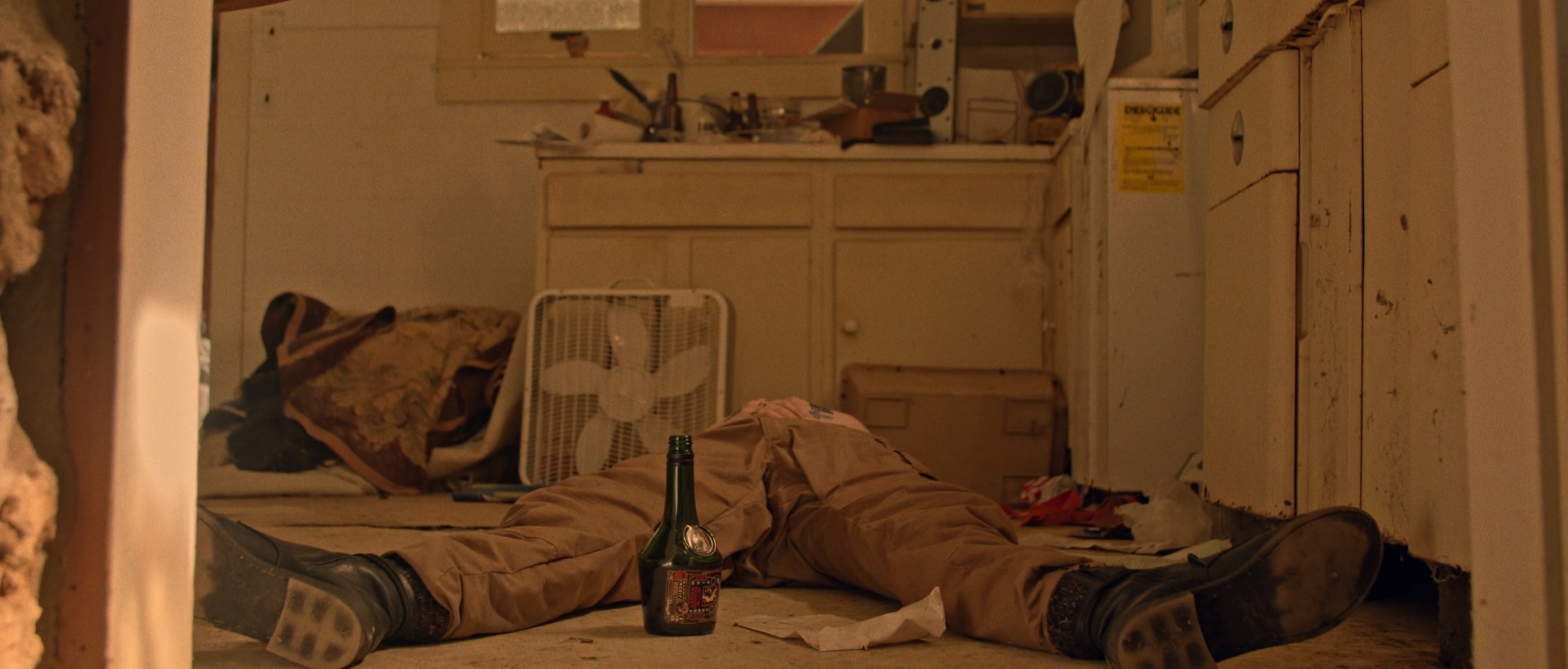
If this were a painting, I’d call it “Self-Destruction.” But, it’s a scene from MUJŌ.
With cinematography and lighting, director Steve Squall and director of photography Justin Gustavison make effective and exceptional use of closeups; controlling our focus, they emphasize important moments, making us intimately involved, more thoughtful about meaning. Tight framing of Meta’s face, eyes, and mouth lingers, revealing nuances of expression and emotion lost in less time. Her eyeball, showcased in one scene, becomes surreal–a jolting shift in perspective–as if the viewer is also, suddenly, being watched. Focus on Meta’s feet, bare and dirty, more than once, remind us that cleanliness is second to survival (as Hollywood too often forgets) and how authentic MUJŌ is. Closeups of objects (empty liquor bottles, books, cigarette butts, etc.) and tattoos are equally utilized, further revealing Meta’s character–her thinking, habits, and style. With this, Squall and Gustavison make things not only larger physically, but larger also as essential, intimate elements of MUJŌ and Meta.
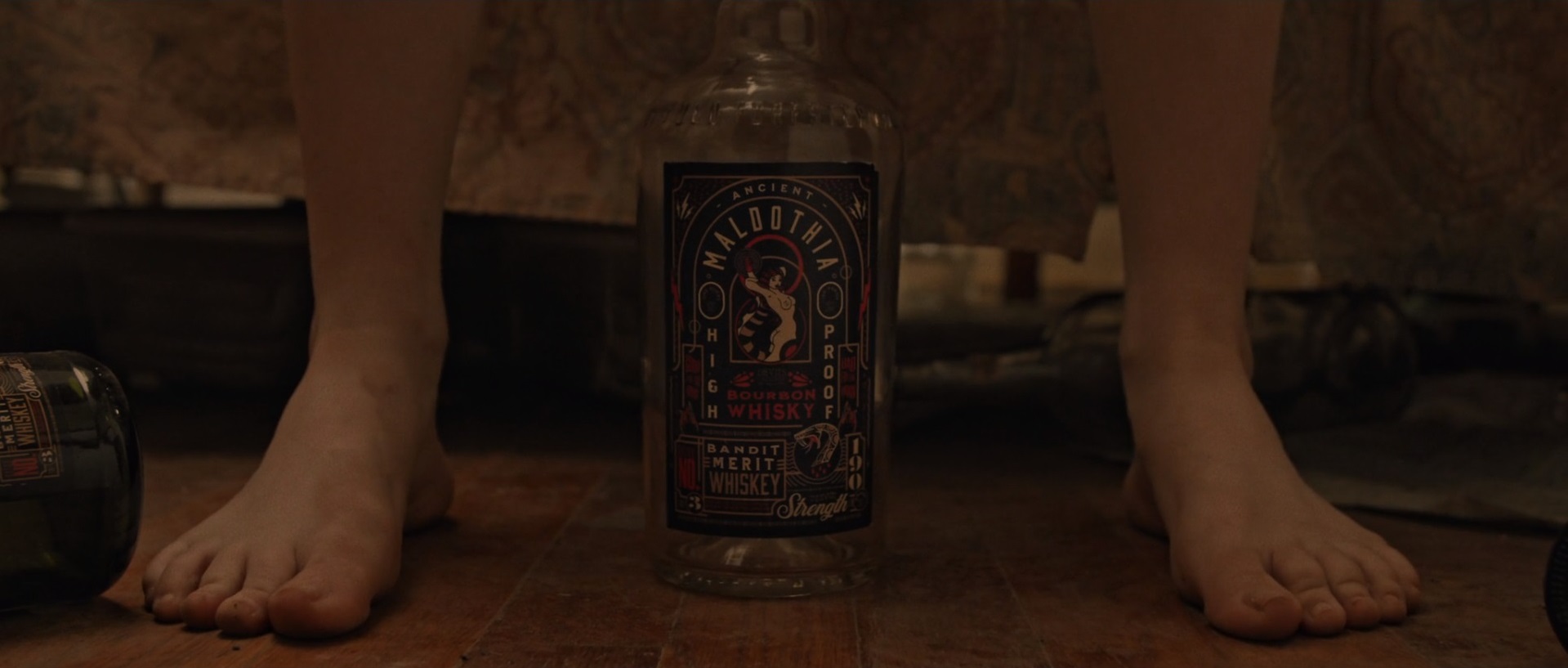
An empty bottle of Ancient Maldothia Whiskey at the bedside…and Meta’s bare feet!
At 11 minutes and 50 seconds in (again accentuated with closeups), a series of otherwise-insignificant background sounds (popping corks, lighters flipping open, heavy breathing, the ticking of a clock, etc.) are amplified and repeated with masterful editing, becoming incredibly-choreographed music. Along with the rhythm, the contrast is captivating–mundane, repetitive, yet oft-unnoticed sounds become, suddenly, fascinating, outstanding, and symbolic. In retrospect, the sounds were heard in the chapter’s beginnings, and all along; although also emphasized, they are dismissed from our minds, filtered out for the other, seemingly more important things happening. Condensed and together, they are highly important, not just as music, but as a meaningful metaphor for monotony, overt and obvious as it becomes–ironically, presented with humor, as a contrast even more. With such poetic content, so uniquely created, hidden for the careful viewer, the movie is elevated to a higher level of filmmaking–most impressive and one of many extras in MUJŌ that make it one to remember and watch again…and again.
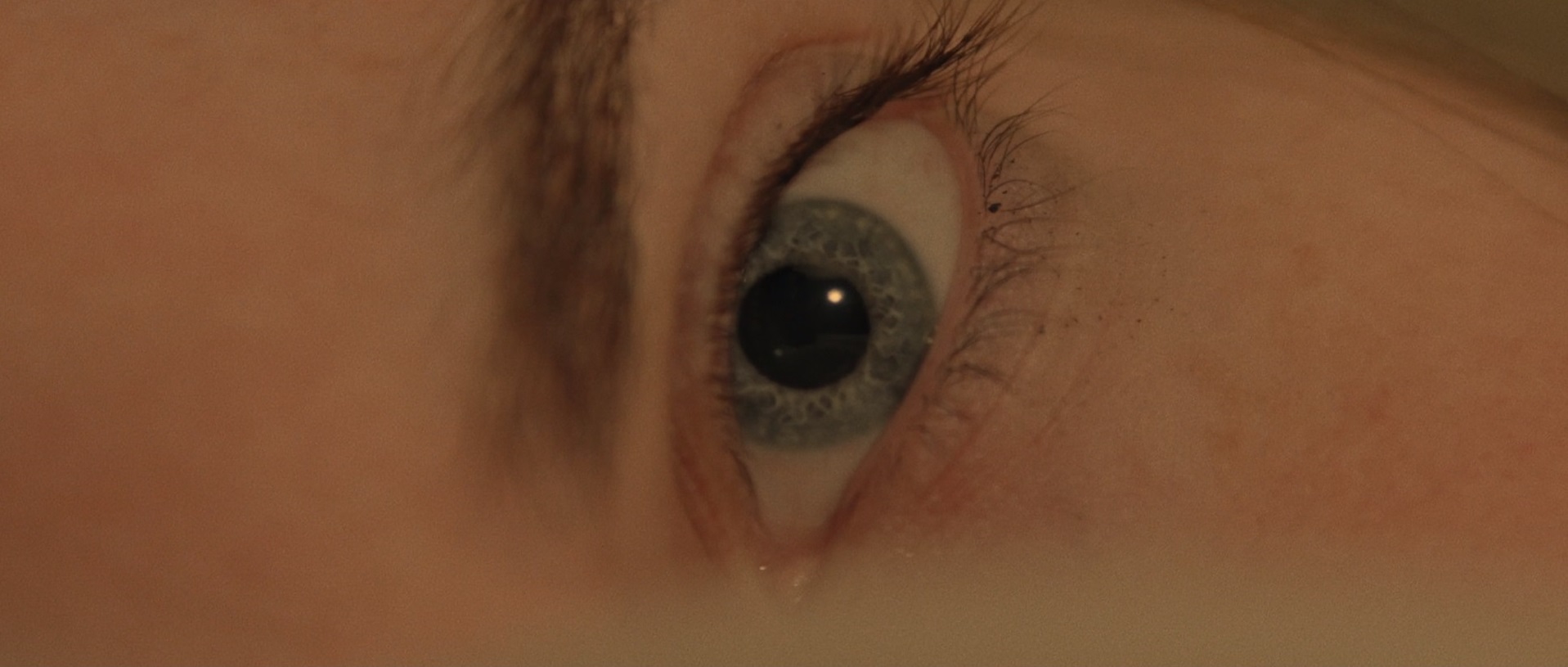
Here’s looking at you, with an ocular MUJŌ closeup–the eye of Meta (Olivia Duff)!
As for the soundtrack, it is addictive. Along with watching the movie more than once, I have replayed the end credits too many times to count. Why? Just to hear the song “Feel Like Finn,” by Jordan Jetson, also from Louisville, Kentucky. Thinking of my favorite films, the song at the end is best when it leaves you with the all-important feeling–the one that complements, so perfectly, the emotions and mood of the movie. With “Feel Like Finn” MUJŌ does exactly that. Upbeat and happy, the song highlights an antithesis–the ominous ending–leaving us, defiantly, with a sense of hope, against a backdrop of dangers unknown. Giving Jordan Jetson’s song the attention it deserves is another welcome effect. I admit that I have now purchased the MP3 version of “Feel Like Finn” on Amazon.com; for just 69 cents, it is a bargain, exponentially! (Check below for a link to Amazon and Jordan’s Facebook page!) And, as for movie clues, does the line “…the wave from the yield of a definite bomb” reveal something else?
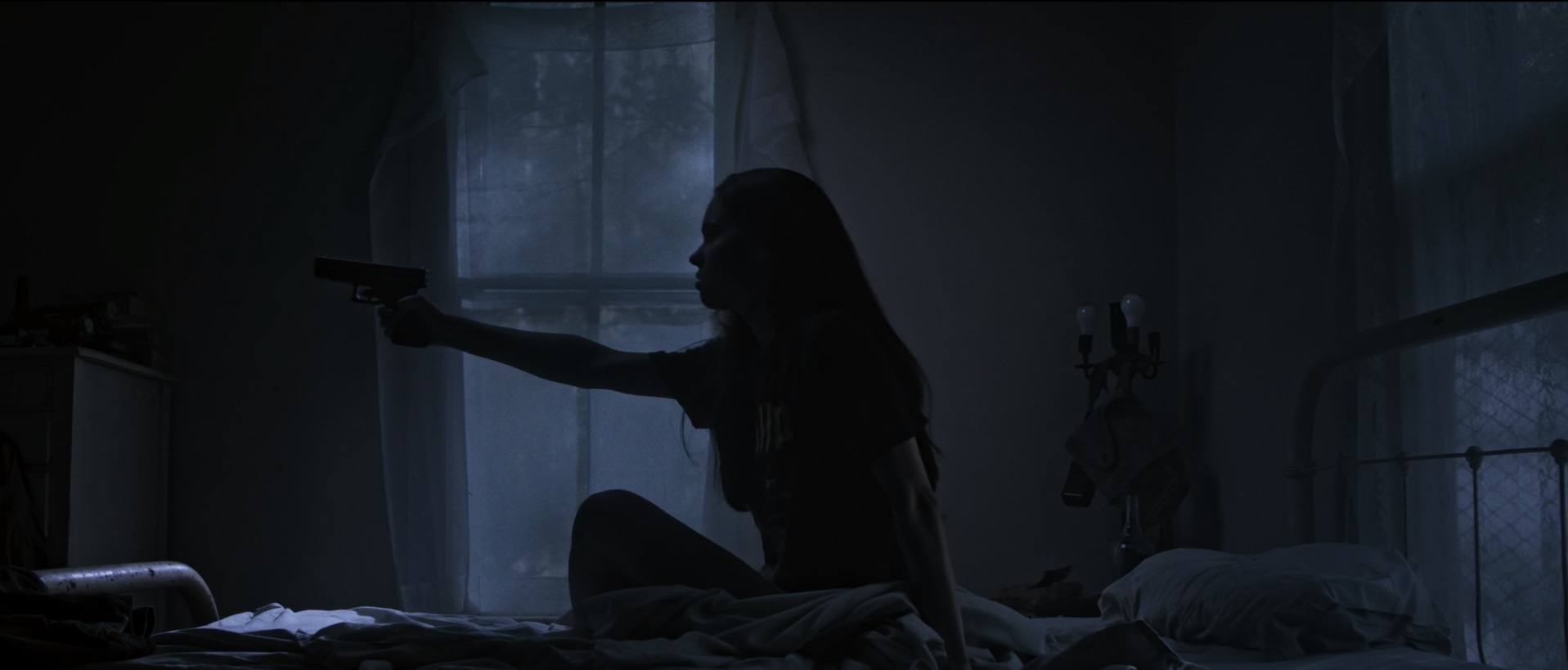
Yes! The bullets in Meta’s gun have someone’s name on them. But, who (or what)?
My review could not be complete without mentioning the outstanding contributions of makeup artist Matt Goodlett (known for Sisyphus and the Rose, also reviewed here on SJR). Goodlett who created and applied Meta’s body tattoos, indeed created more than tattoos in this film. With the importance of the movie’s references, (included in many of the tattoos), Goodlett’s work is not only essential, but also visually stunning–as indelible in the mind, as a tattoo is on skin, certainly. Yes! Most memorable and meaningful, among others, is the “Wasteland Warrior” tatoo on Meta’s back, and the skull/dagger “SCALLYWAG” combo on her belly–all important in defining her personality, as well as suggesting her role in subsequent MUJŌ chapters. And, of course, the MUJŌ logo (as it may be) of the capsule on Meta’s neck is tattoo work of, perhaps, the highest significance.
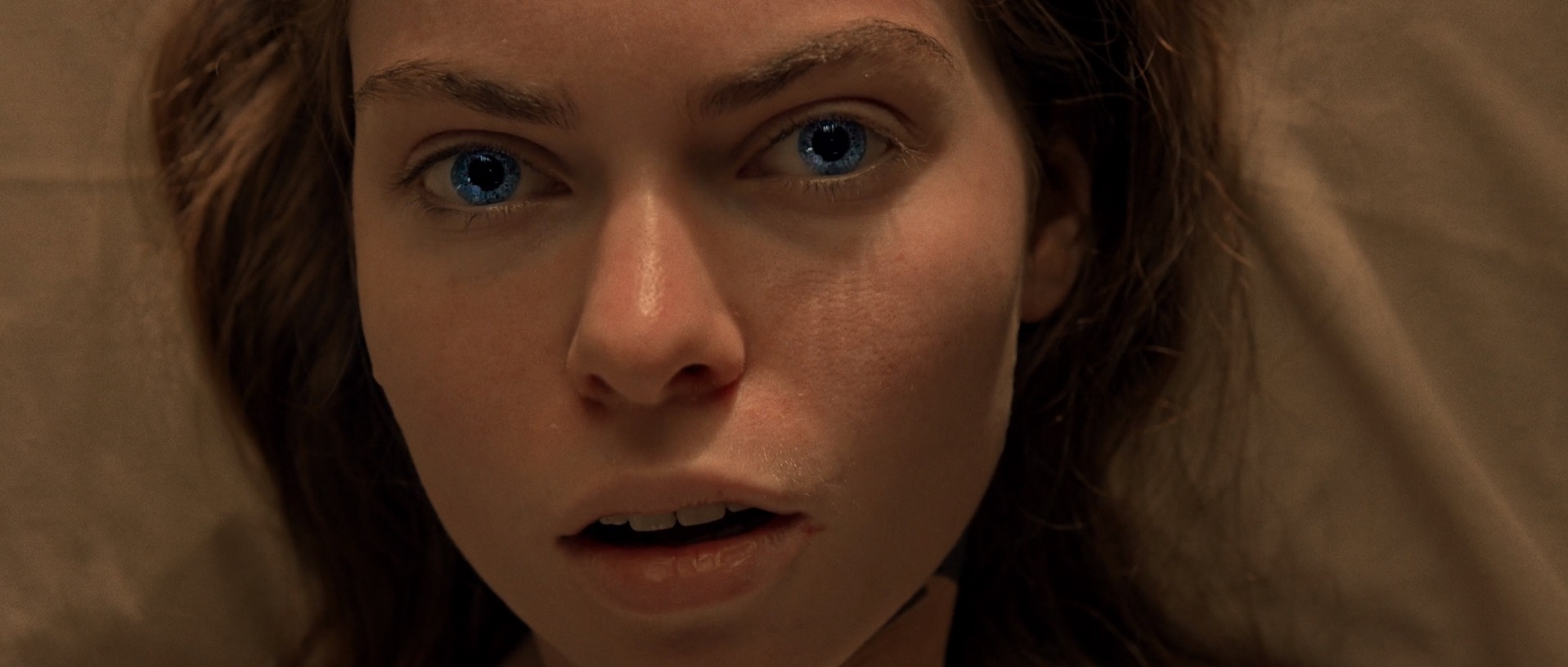
What wonder and mystery sparkles in those beautiful, electric-blue eyes!
Described by director Steve Squall as “a serial odyssey from a group of degenerate filmmakers,” MUJŌ is actually far from anything “degenerate” in film production; the exact opposite (more like distinguished and highly-professional) is more accurate. From beginning to end, MUJŌ has the look, feel, sound, special effects, editing, acting, soundtrack, and writing of the best of Hollywood productions I’ve reviewed. I am impressed, utterly. After seeing it for the first time, my first comment was, without hesitation, “I’m hooked. I didn’t stop once to check the time.” Thinking since, there is ever more to say: “The tragedy of self-abuse with images of future horror are tempered and complemented with mystery and anticipation–the perfect ending for a perfect epic in the making!” And, my 2,400-word review of an 18-minute film says tons more; the layers of complexity and mind fuel in MUJŌ keep you thinking! Coincidentally (but, probably not) the tattoo on Meta’s thigh says, “FOR THE MIND.” And also “for the mind” is MUJŌ!
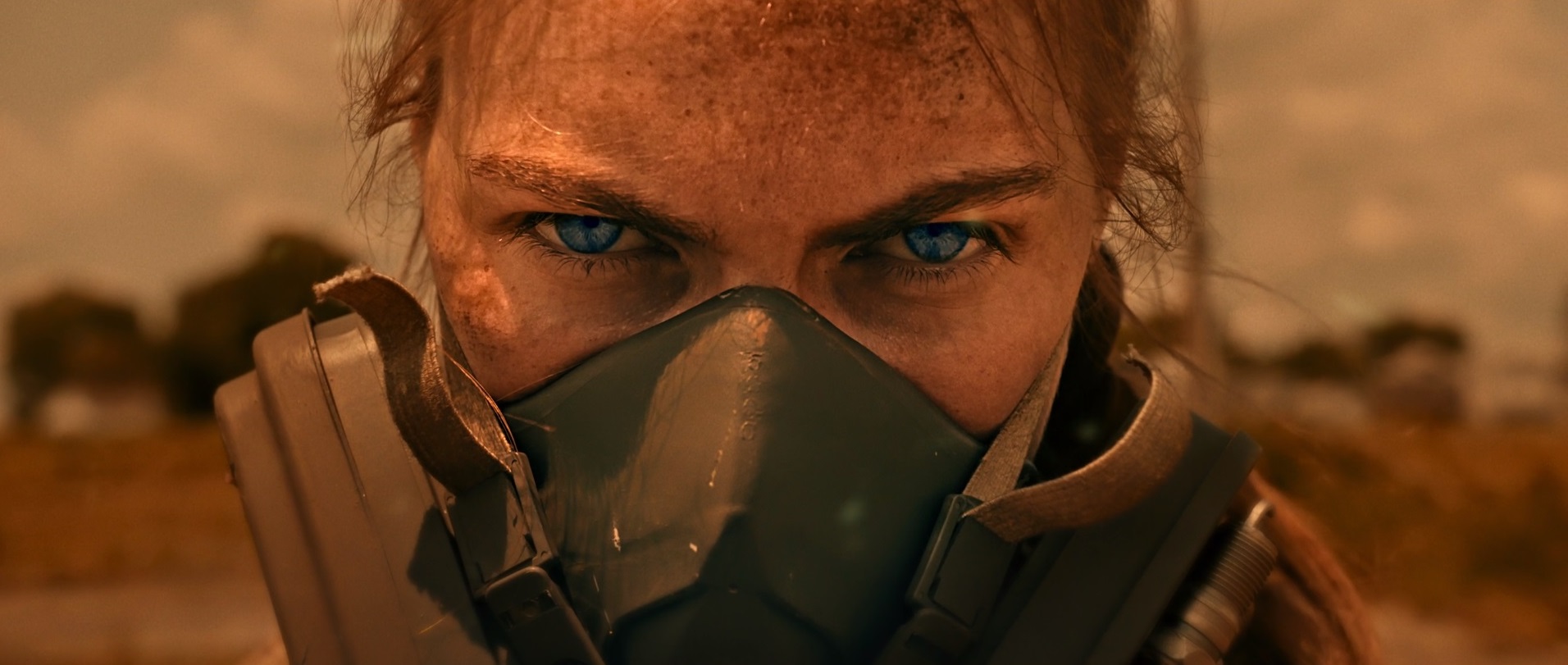
“Don’t f#&k with me” comes to mind, every time I see this!
“You encounter an abandon child at a service station. She begs you to take her with you to the safe zone. Will you help her?”
In a Facebook post from Steve Squall, after he posted “MUJŌ: Chapter A” for the public, he said, “I look forward to seeing what you all think of Chapter A and hope you want to see more, because we want to make more!” And, we certainly want to see more, Steve! If you (the reader) haven’t seen the first chapter yet, check it out below! YES! You read that correctly! It’s here, below, free to see, as many times as you want–even if it’s just to hear “Feel Like Finn,” the sounds of popping corks, heavy breathing, and hammering, or the awesome performance of Olivia Duff. Also, be sure to click on the links below–especially the official MUJŌ website link, where you can donate and help make parts B to Z (or however many there are) possible! In the meantime, enjoy MUJŌ: “Chapter A – Da Introduction” now! If you’re like me, you’ll be “hooked.”
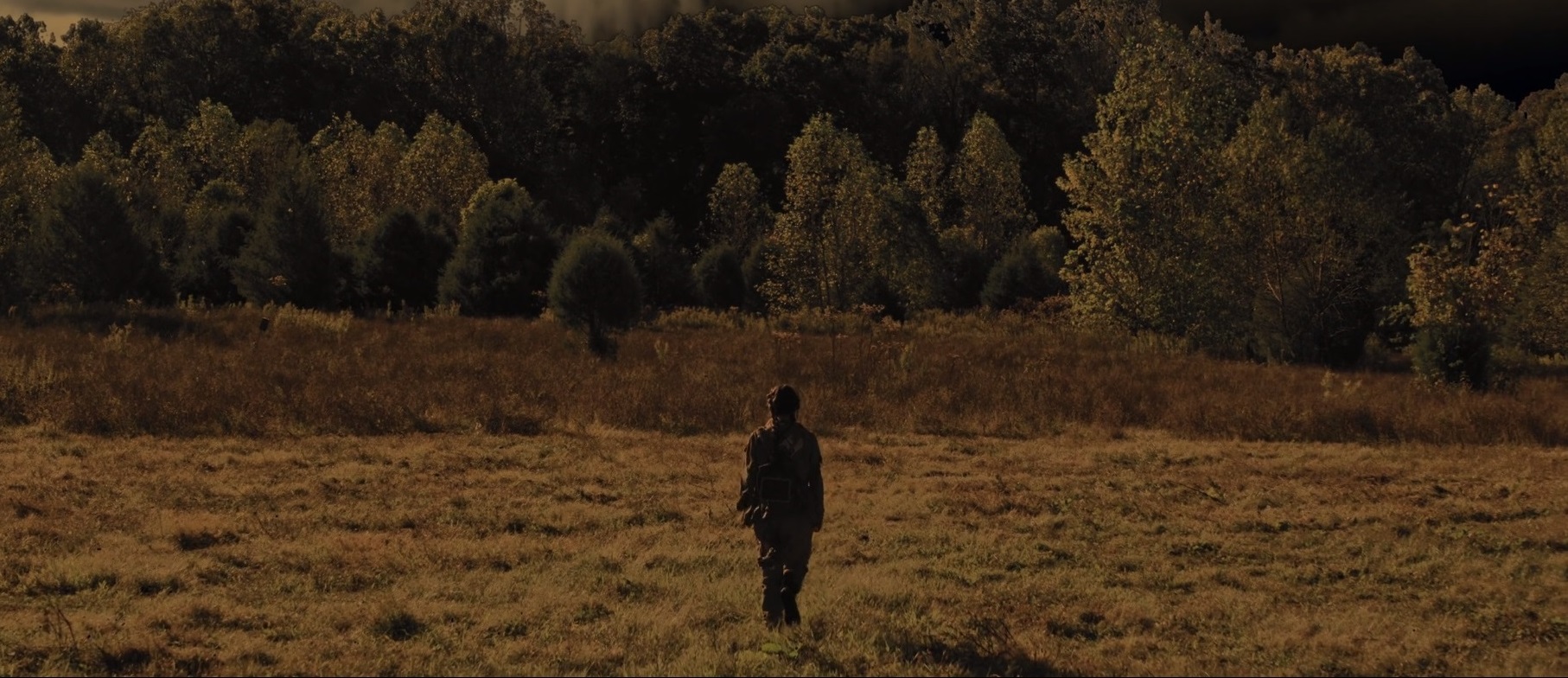
Caption this one yourself, after you see MUJŌ – “Chapter A: Da Introduction”
MUJŌ – “Chapter A: Da Introduction” is written, directed, and executive produced by Steve Squall, with director of photography and editor Justin Gustavison, costumes designed by Kristina Kubrick, visual effects by Matt Niehoff and Justin Gustavison, and makeup artistry by Matt Goodlett. MUJŌ stars Olivia Duff (as Meta), with the voice of Kate Squall (as Ozzy), and Shane Mukaisu Dolleris (as the red-shirted car driver). The awesomely addictive soundtrack (including “Feel Like Finn”) is by Jordan Jetson and Jeremy Richie.
For trailers, behind-the-scenes extras and more, visit the official MUJŌ webiste!
Visit director Steve Squall’s official website at http://www.stevesquall.com/
Like and Follow Steve Squall Photography on Facebook at facebook.com/stevesquallphoto!
Make a contribution to keep the MUJŌ epic going by clicking here!
Like and follow the incredibly-talented musician, Jordan Jetson, on Facebook!
Visit Jordan’s website at www.jordanjetson.com!
Purchase the MP3 track of Jordan Jetson’s “Feel Like Finn” on Amazon!
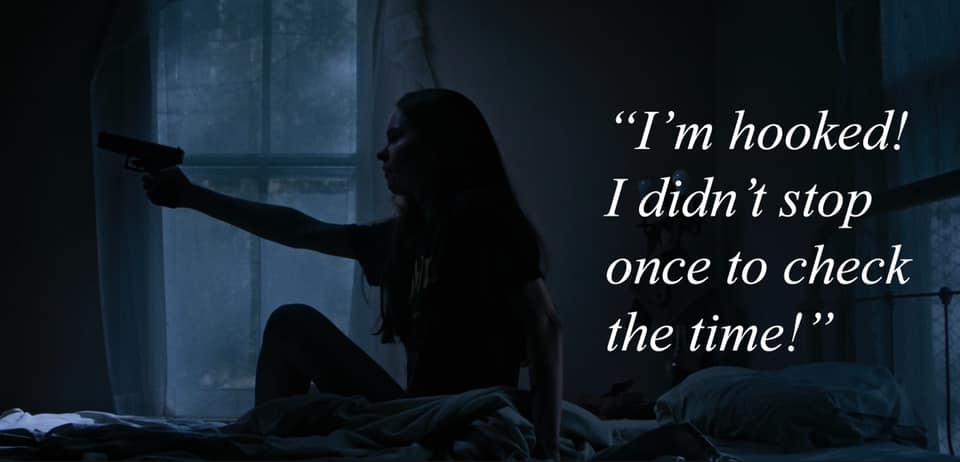

Rocket Rating – 10
Chris Rennirt (the author of this review) is a movie critic and writer in Louisville, Kentucky, as well as editor in chief at Space Jockey Reviews. He has been a judge at many film festivals, including Macabre Faire Film Festival and Crimson Screen Film Fest, and he attends horror and sci-fi conventions often. Chris’ movie reviews, articles, and interviews are published regularly on Space Jockey Reviews and in Effective Magazine. His mission statement (describing his goals as a movie critic and philosophy for review writing) can be found on the “Mission” page, here at SJR. For more information about Chris Rennirt (including contact details, publicity photos, and more), click here.
You may also like these!










